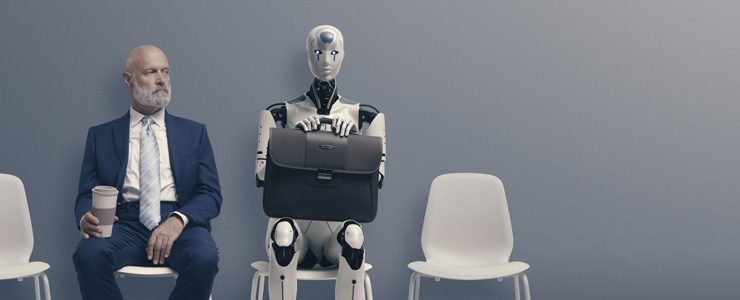
How will AI affect the workplace
Artificial intelligence is already present in our daily life, influencing everything we do online, from how we shop to our search results. The question being asked by many is how will AI affect the workplace?
While no-one can give a definitive answer, various studies have been carried out to try and estimate whether jobs will be affected by future advances in technology.
Some critics fear AI will result in mass redundancies, as groups of people whose jobs have been automated can no longer find work. Others suggest super-intelligent computers may overrun the planet, leaving the people who built them with little to do. Fans of AI hope robots may be intelligent enough to serve people, heralding a new age of leisure and prosperity. Whatever your thoughts, AI is here to stay; technology takes huge strides forward every day.
What is AI?
Defined as the simulation of human intelligence by machines, particularly computer systems, applications for AI include machine vision, expert systems, speech recognition, natural language processing and more.
Based on a foundation of specialised hardware and software to write and train machine learning algorithms: no single programming language can deliver AI, but Java, Python, R, Julia and C++ all have features that are often used by developers.
An example is a chatbot: Fed examples of text, this has taught it to generate lifelike exchanges with people. Another common use is an image recognition tool that can learn to identify objects in pictures by reviewing millions of examples.
With programming focusing on cognitive skills including learning, reasoning, self-correction and creativity; today’s AI techniques are improving rapidly and can now create realistic music, text, images and other media.
Why are workers anxious about AI?
People have always felt anxious about the rise of machines in the workplace. For centuries, each innovation has threatened someone’s livelihood. In the 16th century, William Lee modified looms used for carpet-making to manufacture stockings. Historians believe Queen Elizabeth I refused to grant him a patent for the machine, because she feared the people who hand-knitted stockings would lose their jobs.
In the 19th century, England’s textile workers faced the Industrial Revolution. Steam-powered machinery enabled previously handcrafted items to be made in bulk in factories. Many workers joined the Luddites movement to protest about the use of automation.
In the late 20th century, the use of robots in vehicle manufacturing increased. In 1979, Fiat’s TV commercial depicting its Strada hatchback being “handmade by robots” caused alarm. Jobs on the assembly line, including spray-painting and welding, were automated, but people were needed to supervise the machines.
Every time new technology has been introduced, there has been an element of panic. AI is the latest technological advance to cause alarm.
How are workplaces trying to implement AI?
An increasing number of workplaces are trying to use AI within their day-to-day practices.
Analysts have suggested jobs that could be done by robots include food serving, cashiers and customer services. However, as with earlier innovations, they believe AI will create value and have a positive effect on society.
More businesses began using AI during the Covid pandemic, when people couldn’t go to work. The jobs being carried out by robots included cleaning airport floors and taking passengers’ temperatures.
Tech company Chowbotics created a robot called Sally to prepare salads in the canteens of hospitals and universities. Manufacturers of hospital beds and cotton swabs commissioned industrial robot producer Yaskawa America to help them make in-demand items faster.
Chatbots are often used for companies’ live chat services instead of human customer care advisors in call centres. In some hotels, a robotic butler delivers towels and toothbrushes to the rooms.
Is AI the future of work?
Experts say the way the media has portrayed AI has caused anxiety unnecessarily. The general consensus is that humans will never be rendered obsolete in the workplace.
As technology advances, more tasks once handled by people have been automated. However, while AI is changing the workplace as we know it, experts say robots won’t be taking over everyone’s work any time soon.
A report entitled Artificial Intelligence and the Future of Work, by the MIT Task Force, gives a positive view on AI. It suggests new technology will drive innovation, but rather than leading to the end of human labour, it will create new, different jobs.
There are also limitations to AI’s ability when it comes to recreating human intelligence. The algorithms can do only one job or solve one problem at a time. Usually unable to “think” outside their programmed parameters, they can’t respond to changes in input.
What does AI mean for the business?
Primarily, using AI could enhance productivity. As technology continues to improve, it could have a positive impact on the economy in terms of growth, innovation, market power and employment.
Studies in Europe and the US suggest around 35% of firms currently use AI in some form, with 42% saying they plan to do so in the future. Almost every industry has embraced the concept of AI to increase productivity, efficiency and client satisfaction, according to IBM.
The companies that use it have higher labour productivity in general. However, only a small percentage of companies fully grasp the potential value of AI and use it in their workflow. Research points to a lack of understanding of how it can help, or a lack of financial resources to pursue it further.
By constantly monitoring technical improvements and breakthroughs, companies can follow a more effective path and implement technology more widely.
Can AI be trusted?
Over the past few years, machine learning and AI has developed at an unprecedented rate. Some experts believe the rate of development will double every few years for the foreseeable future.
However, it still suffers from uncertainty issues. Research is ongoing into designing AI systems that can provide users with an accurate measure of certainty. Like people, an AI system can make mistakes. The key is getting it to recognise a mistake before it’s too late.
For example, if a self-driving car mistakes a white trailer crossing a motorway as a patch of sky, it could have serious consequences. Ideally, the AI should realise it has made a mistake and alert the human, or a backup system, to take over before it’s too late. For the designers, this is an incredibly complex technical task to achieve.
Coworking space
Headspace Group’s coworking space in Southampton delivers first-class facilities located in an urban designed environment.
With high-speed internet throughout, secure and monitored access and excellent natural daylight, coworking in Southampton means a tranquil setting with a focused, professional work domain. Contact us to book a tour or for more information.
© Stokkete / Shutterstock.com



